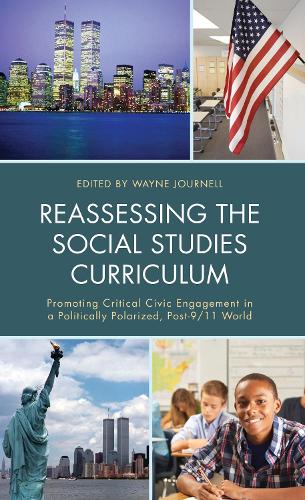
Reassessing the Social Studies Curriculum: Promoting Critical Civic Engagement in a Politically Polarized, Post-9/11 World
(Paperback)
Available Formats
Publishing Details
Reassessing the Social Studies Curriculum: Promoting Critical Civic Engagement in a Politically Polarized, Post-9/11 World
By (Author) Wayne Journell
Bloomsbury Publishing PLC
Rowman & Littlefield Publishers
3rd May 2016
United States
Classifications
Professional and Scholarly
Non Fiction
Educational: Social sciences, social studies
Educational: Citizenship and social education
300.71
Physical Properties
Paperback
152
Width 175mm, Height 256mm, Spine 9mm
327g
Description
The terrorist attacks of September 11, 2001 dramatically changed many aspects of American society, and the ramifications of that horrific event are still impacting the domestic and foreign policies of the United States. Yet, fifteen years after 9/11an event that was predicted to change the scope of public education in the United Stateswe find that the social studies curriculum remains virtually the same as before the attacks. For a discipline charged with developing informed citizens prepared to enter a global economy, such curricular stagnation makes little sense. This book, which contains chapters from many leading scholars within the field of social studies education, both assesses the ways in which the social studies curriculum has failed to live up to the promises of progressive citizenship education made in the wake of the attacks and offers practical advice for teachers who wish to encourage a critical understanding of the post-9/11 global society in which their students live.
Reviews
Featuring some of the most important leaders in social studies education, Reassessing the Social Studies Curriculum brings into focus the state of civic education and the construction of citizenship and national identity in post-9/11 United States. At different points historical, empirical, and critical, this book is an important and poignant read for anyone teaching social studies amidst the seemingly endless U.S. War in the Middle East. -- Wayne Au, Associate Professor, University of Washington Bothell; editor, Rethinking Schools
Why hasnt social studies education evolved since the events of September 11, 2011 What principles, philosophies, and instructional approaches could guide educators grappling with teaching about 9/11 in critical, culturally responsive, and daring ways This remarkable book, with contributions with a range of outstanding social studies scholars, answers these questions and more, providing a much needed resource to those who are hopeful about the possibilities for social studies education in a post 9/11 world. -- Anne-Lise Halvorsen, Associate Professor, Michigan State University
The diverse chapters in Reassessing the Social Studies Curriculum: Preparing Students for a Post-9/11 World explore compelling and important topics that generate necessaryand fascinatingconversations, considerations and questions about the status, place, and potential of social studies in the post-9/11 world. Borrowing a quote from Keith Bartons chapter, the work in this book moves beyond discrete and obvious reactions to a critical event and examine[s] its deeper, more gradual, and ultimately more profound effects. The authors offer theoretical as well as practical considerations for those interested in social studies education and thoughtfully analyze the curricular implications of such a significant and tragic event in history. Journells book is an important contribution to the field. -- Stephanie van Hover, Associate Professor and Chair of the Department of Curriculum, Instruction, and Special Education, University of Virginia
Teaching basic historical events is now much more complicated than it was in the past; there is a sense of constant change both at home and abroad. Reassessing the Social Studies Curriculum helps teachers understand the need to illuminate the gray realities of our previously black and white view of history. It offers teachers strategies to help post-9/11 students have deeper understandings so that they can make conceptual connections. -- Kim ONeil, President of the National Council for the Social Studies
Author Bio
Wayne Journell is an associate professor of secondary social studies education and secondary teacher education program coordinator at the University of North Carolina at Greensboro. His research interests include the teaching of politics and political processes in secondary education.
